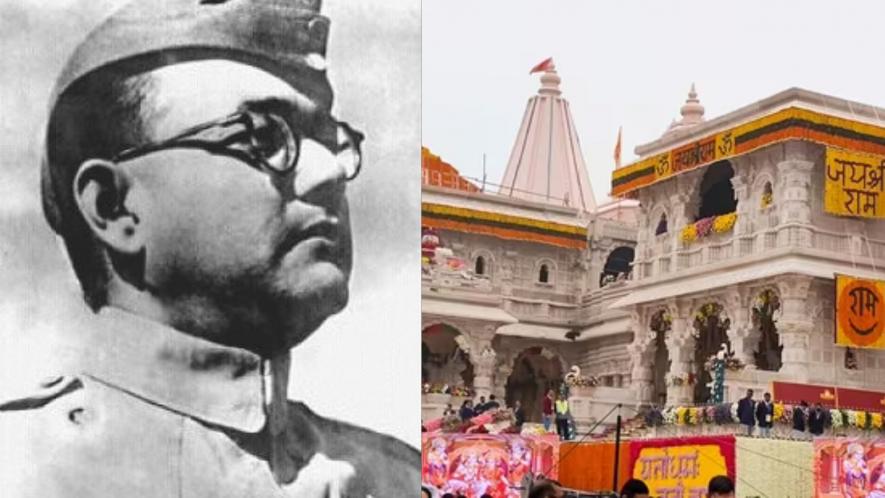Ram Temple Consecration Stands in Sharp Contrast to Netaji’s Vision of Secular India

Image Courtesy: PTI
On January 23, the birth anniversary of Netaji Subhas Bose is being celebrated. Just a day before, on January 22, Prime Minister Narendra Modi participated in the consecration of the under-construction Ram Temple being built in Ayodhya where the 500-year-old Babri mosque was demolished in 1992. It was, in the words of the Supreme Court, an “egregious violation of rule of law”.
Had Subhas Bose been alive today, he would have been shattered to see his vision of India, rooted in protection of cultural liberties all people regardless of their faiths, being violated. That violation was manifested in a sinister manner when the destruction of the Babri Mosque took place, and Prime Minister Modi, representing the secular State of India, actively associated himself with the consecration of Ram Temple riddled with religious values and rituals.
Netaji would have found such participation of the elected Prime Minister, owing allegiance to the Constitution of India, unacceptable. He would have recalled the proclamation of the Provisional Government he established in 1945 in South East Asia and took oath as its Prime Minister.
The proclamation of that government, set up for the whole of India, declared, “It guarantees religious liberty, as well as equal rights and equal opportunities to its citizens”. In addition, it declared “…its firm resolve to pursue the happiness and prosperity of the whole nation equally and transcending all the differences cunningly fostered by an alien Government in the past."
At the centre of that proclamation remained the freedom of India and religious liberty of all Indians. Such an inclusive vision of our country remained integral to Netaji’s worldview which got shaped by his understanding of Indian history free from any distortion or bias rooted in communalism or religious discord.
In his book, An Indian Pilgrim, Netaji flagged the shared cultures of all religious groupings, be they Hindus or Muslims, who took pride in their commonalities fostered over thousands of years of coexistence in the face of all the challenges. In the book, he interpreted the Battle of Plassey as one in which both Hindus and Muslims jointly fought against British occupation of India.
He also rejected the false narrative that Mughal rule in India was an era of slavery. He wrote in the aforementioned book, "History will bear me out when I say that it is a misnomer to talk of Muslim rule when describing the political order in India before the advent of the British. Whether we talk of the Moghul Emperors at Delhi, or of the Muslim Kings of Bengal, we shall find that in either case, the administration was run by Hindus and Muslims together, many of the prominent Cabinet Ministers and Generals being Hindus' '.
Netaji proceeded to add, “Further the consolidation of the Moghul Empire in India was affected by the help of Hindu commanders-in-chief. The Commander-in-chief of Nawab Sirajudowla, whom the British fought at Plassey in 1757 and defeated, was a Hindu and the rebellion of 1857 against the British, in which Hindus and Muslims were found side by side, was fought under the flag of a Muslim, Bahadur Shah."
With such an understanding of history, Netaji would have been shocked by Prime Minister Modi’s formulation that there was slavery in India for 1,200 years and that there was a movement spanning 500 years to reclaim the Babri Mosque and build the Ram temple on that very spot. The narrative of Modi while consecrating the temple in Ayodhya, that Ram is Vidhan, Ram is the law of the land, Ram is Rashtra, etc., would also have shocked Netaji, whose understanding of India and the idea it represented had nothing to do with any God or deity.
He would have found it very troubling to see nationalism in 21st century India being woven with the religion of the majority community at the behest of the powers that be. People belonging to the ruling Bharatiya Janata party (BJP) and its affiliates shouting ‘Jai Shri Ram’ and employing it against those pursuing a different faith, would have caused deep anguish to him because ‘Jai Hind’, the rallying slogan of the Indian National Army, united all Indians for the cause of freedom and liberation of India from British rule.
Netaji would have been horrified to see important people attending the Ayodhya meeting on January 22, and shouting slogans for Hindu Rashtra. That meeting was addressed by the Prime Minister.
Netaji lived and died fighting for the freedom of secular India in which there is no scope for defining the State and country in terms of the divisive idea of Hindu Rashtra. No wonder, that an INA soldier famously said that when Netaji was taking oath as Prime Minister of the Provisional Government in 1945, at a time when religion was used in India to divide people, the Indian National Army rallied around the slogan of ‘Jai Hind’.
Such slogans of pan-India significance are of critical significance for unifying people who often get divided by religious slogans, dismembering the unity and harmony of society. Mahatma Gandhi hailed Netaji as a ‘prince among patriots’ and appealed to people to learn from him the lessons of communal harmony to sustain India’s unity and integrity, which was being threatened by highly polarised narratives spun on a continuous basis by those controlling the State apparatus.
The author served as an Officer on Special Duty to the President of India, KR Narayanan. The views are personal.
Get the latest reports & analysis with people's perspective on Protests, movements & deep analytical videos, discussions of the current affairs in your Telegram app. Subscribe to NewsClick's Telegram channel & get Real-Time updates on stories, as they get published on our website.























